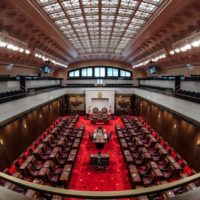News
Election laws set to be modernized before the next federal election
Bill C-76 passes the Senate with a technical amendment.
Legislation that brings Canada’s election laws into the 21st century and makes it easier for Canadians to vote has been passed into law after being adopted in the Senate.
Bill C-76 has four main goals: to make the electoral process more accessible, more secure and more transparent, as well as to modernize the administration of elections.
In November, Senators heard from Chief Electoral Officer Stéphane Perrault and Commissioner of Canada Elections Yves Côté during a special hearing in the Red Chamber. The top two elections officials urged Senators during a two-hour committee of the whole meeting to adopt the legislation before rising for the winter break to ensure there was enough time to implement the changes ahead of the next federal election.
“Senators had the opportunity to talk with the Chief Electoral Officer and the Commissioner of Canada Elections, who both continue to support Bill C-76 and who said it would be good for our electoral system if this bill came into force before the next election,” said Senator Dennis Dawson, who sponsored the legislation in the Senate.
The bill was adopted in the Senate with a technical amendment on Monday, and the House of Commons concurred with the amendment on Thursday.
Accessibility and modernization
Among the many changes, Bill C-76 makes it easier for Canadians with disabilities to vote, by increasing assistance at the polls and extending the process to vote at home for voters with disabilities.
It also gives greater flexibility in voting to members of the Canadian Armed Forces members.
Furthermore, the legislation reintroduces the voter information card as a valid piece of identification that can be used at the polls. A 2016 Statistics Canada survey found that more than 170,000 Canadians said that a lack of ID was why they did not vote in the 2015 election.
Bill C-76 also updates the administration of elections to reduce wait times at polling stations, to allow Canadians under 18 to serve as election officials and to extend advance polling hours from 9 a.m. to 9 p.m.
The legislation also limits the election period to a maximum of 50 days.
Security and transparency
Security is another main focus on the legislation, with elements that aim to curb threats posed by foreign interference, online disruption and disinformation. That includes:
- Prohibiting foreign entities from spending any money to influence elections (they can currently spend up to $500 on election advertising);
- Creating a new offence against obstructing, interrupting or interfering with computer data during an electoral period;
- Requiring online platforms, such as Facebook, Twitter and Google, to maintain a publicly accessible registry of political ads published during the pre-election and election periods;
- Prohibiting communication during an election period that intends to mislead the public about the source of the information (whether it be a political party or an election official); and
- Requiring political parties to have a privacy policy for the protection of personal information, which would be made publicly available online.
The legislation also changes spending limits for third parties and political parties during an election period, as well as establishes spending limits for third parties and political parties during the pre-election period. It further requires third party advertisers to identify themselves on partisan advertising during the pre-election period, a rule that already exists during the election period.




















































